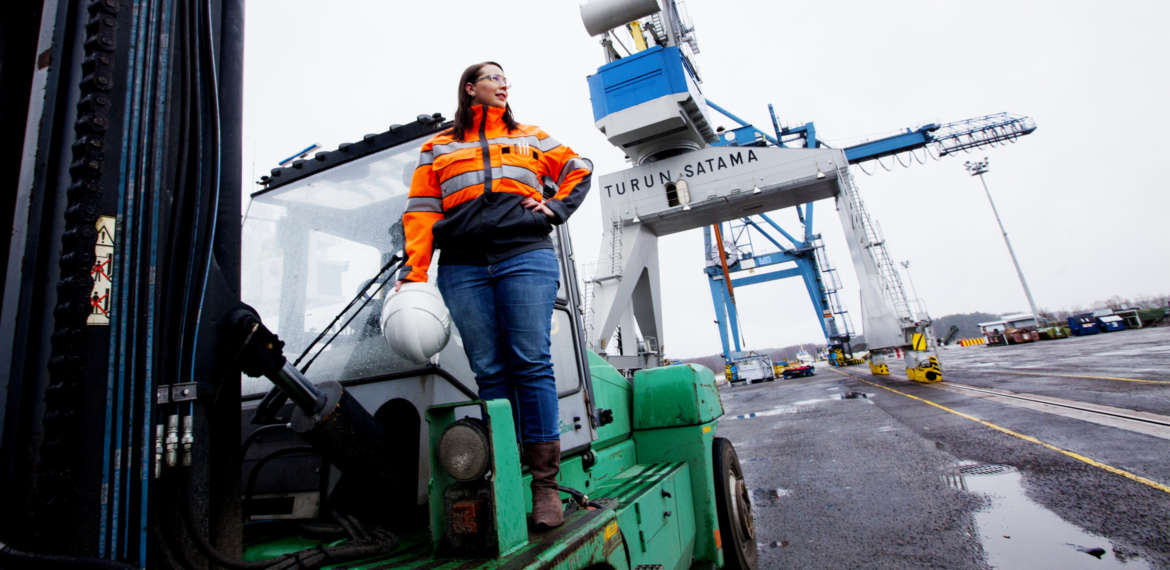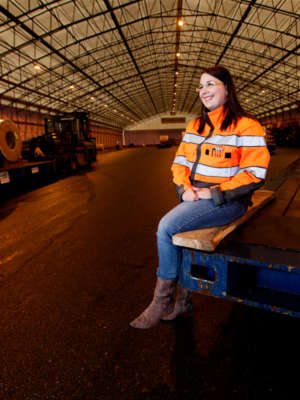No two working days are the same for a Logistics Manager
Logistics Manager Riika-Maria Iljin has grown almost without noticing into a solid expert in logistics industry.

Riika-Maria Iljin started as a summer employee in the family-owned company Turku Stevedoring at the age of 14. Then she worked in the warehouse at Movere for several years, but motivation drove her to continue studying. Ms Iljin completed the degree of Bachelor of Science, vehicle and transport technology, at the Turku University of Applied Sciences.
At Turku Stevedoring, Riika-Maria Iljin represents the second generation.
“I started as an office secretary, till the transport volumes began to grow and we needed a full-time logistics manager.”
“The work involves calculating resources, reporting, and creating documents. I act as the link to customers”, Ms Iljin says.
The pieces need to fit together to make the system work. The most important thing is that everything gets done on time.
The customer base is wide; Ms Iljin manages co-operation with shipping companies and transport firms as well as customers. Turku Stevedoring does not do just stevedoring, but Ms Iljin also arranges warehousing and value added services. When a plant places an order for goods, she sees to it that all intermediate phases are taken care of.
“Our slogan is ‘customer-oriented service’. We focus on know-how and equipment developed by ourselves.”
Some of the value added services are provided in the port area, others by subcontractors elsewhere. Ms Iljin manages the challenges presented by transport equipment, such as containers, trailers, and rolltrailers, and carrying of bulk goods.
“The volumes are really big.”
Anticipation is always needed
Riika-Maria Iljin has worked as Logistics Manager since 2013. She did not take her selection for the position for granted, but believes that she has successfully developed the company’s logistics expertise.
 “You have to know the rules and learn from your mistakes”, Ms Iljin says. “I have been able to question certain ways of working, such as efficiency. Sometimes you can do a number of tasks at the same time.”
“You have to know the rules and learn from your mistakes”, Ms Iljin says. “I have been able to question certain ways of working, such as efficiency. Sometimes you can do a number of tasks at the same time.”
“You have to know how to anticipate forthcoming stevedoring and the customers’ needs. Advance notification and information search have been developed over time. The basic tools, such as booking calendar must be in order. When vehicles or containers now arrive, you’re right away up to date.”
Information on ships and their progress can be followed online.
Ms Iljin also updates the company’s own website.
“I want to learn something new all the time and see how things could be done better.”
Enough resources, but not too much
Riika-Maria Iljin heads three supervisors and a group of 40 stevedores who are also trained to provide value added services. The flow of goods mainly focuses on Baltic Line’s weekly liner ships and Tallink Silja’s daily traffic.
“We are continuously following what’s happening. Everyone has to know what to do, and there needs to be enough staff, but no idle employees.”
With Tallink Silja, they only have one hour.
“The boys know how to do it. The tight schedule means challenges, but we’ve always made it.”
“My job is interesting, no two days are the same. I try to be fair in every way and hope to be treated like that myself. Sense of humour is required in this business. You won’t get along with the boys unless you have a little twinkle in the eye.”
Text Sini Silvàn
Photos Robert Seger
